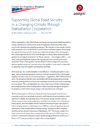-
How Effective Is the Extractive Industries Transparency Initiative? And a Transatlantic Food Security Strategy
April 28, 2016 By Gracie Cook Sovacool et al. in a study published in World Development compare the performance of the first 16 member countries of the Extractive Industries Transparency Initiative (EITI) to their performance before membership and to other non-member countries and find little difference in most governance and economic development categories. The authors write that this is the first empirical data-driven report to assess the initiative. Compared to a sample of non-member countries, the EITI countries had similar rates of improvement in sectors such as corruption, political stability, and rule of law, as measured by the World Bank’s Worldwide Governance Indicators. The authors credit these results to the “limited mandate” of EITI, which cannot effectively promote transparency in public spending or account for corrupt activities of individuals within the extractive industries. Additionally, they recognize the voluntary nature of EITI, transparency resistance from stakeholders, and EITI’s dependence on a strong civil society as contributing factors to lower-than-anticipated improvements. As more countries and companies active in the oil, gas, and mining industries support and recognize EITI, this research may provide insights into how to improve results.
Sovacool et al. in a study published in World Development compare the performance of the first 16 member countries of the Extractive Industries Transparency Initiative (EITI) to their performance before membership and to other non-member countries and find little difference in most governance and economic development categories. The authors write that this is the first empirical data-driven report to assess the initiative. Compared to a sample of non-member countries, the EITI countries had similar rates of improvement in sectors such as corruption, political stability, and rule of law, as measured by the World Bank’s Worldwide Governance Indicators. The authors credit these results to the “limited mandate” of EITI, which cannot effectively promote transparency in public spending or account for corrupt activities of individuals within the extractive industries. Additionally, they recognize the voluntary nature of EITI, transparency resistance from stakeholders, and EITI’s dependence on a strong civil society as contributing factors to lower-than-anticipated improvements. As more countries and companies active in the oil, gas, and mining industries support and recognize EITI, this research may provide insights into how to improve results. In a brief by the Center for American Progress and adelphi, Michael Werz and Benjamin Pohl present ways the United States and Europe can work as a team to address global food security challenges. “Volatility is likely to be the new normal as climate change, demographic shifts, and other factors continue to reshape the global environment in the years and decades ahead,” write the authors. Food security has become an international security issue in the wake of two major food price crises in the last 10 years and as population levels rise and more countries become reliant on imports. The authors focus specifically on the Arab Spring’s illumination of the links between climate change, energy, food, and security, and recommend a joint effort by transatlantic partners in all sectors to prevent future crises. In particular, they propose improved access to food industry data, sharing technological innovations, the balancing of humanitarian and structural development assistance, and the creation of improved global food security governance structures to ensure aid is coordinated effectively. The authors address the importance of a long-term approach between the United States and European countries to dealing with climate change and food security, and write that “it is paramount that [transatlantic] dialogue and action address not only the crisis of the day, but also the structural challenges.”
In a brief by the Center for American Progress and adelphi, Michael Werz and Benjamin Pohl present ways the United States and Europe can work as a team to address global food security challenges. “Volatility is likely to be the new normal as climate change, demographic shifts, and other factors continue to reshape the global environment in the years and decades ahead,” write the authors. Food security has become an international security issue in the wake of two major food price crises in the last 10 years and as population levels rise and more countries become reliant on imports. The authors focus specifically on the Arab Spring’s illumination of the links between climate change, energy, food, and security, and recommend a joint effort by transatlantic partners in all sectors to prevent future crises. In particular, they propose improved access to food industry data, sharing technological innovations, the balancing of humanitarian and structural development assistance, and the creation of improved global food security governance structures to ensure aid is coordinated effectively. The authors address the importance of a long-term approach between the United States and European countries to dealing with climate change and food security, and write that “it is paramount that [transatlantic] dialogue and action address not only the crisis of the day, but also the structural challenges.”Sources: adelphi, Center for American Progress, World Development.
 A Publication of the Stimson Center.
A Publication of the Stimson Center.





